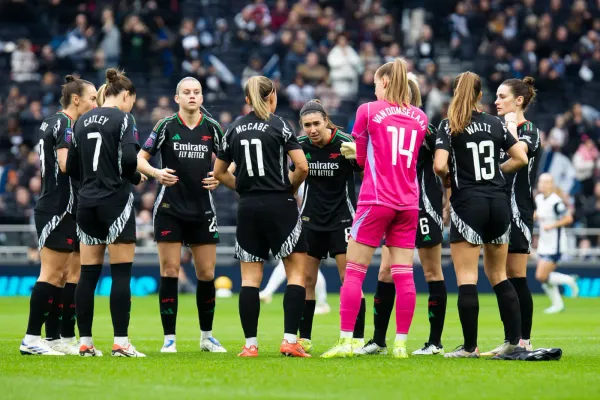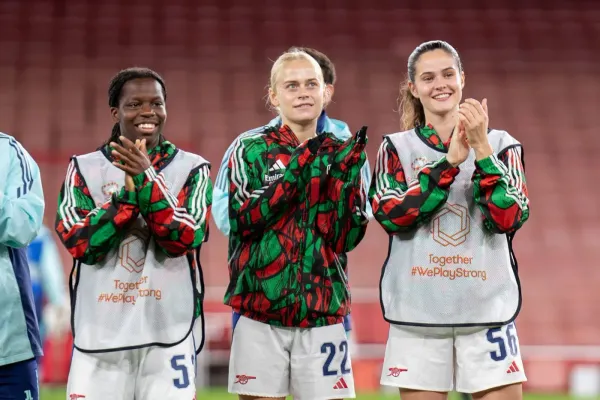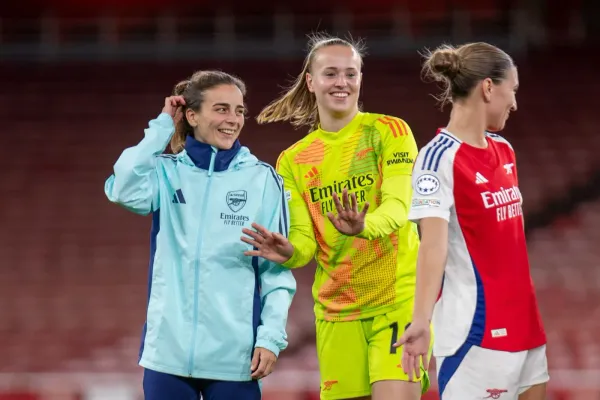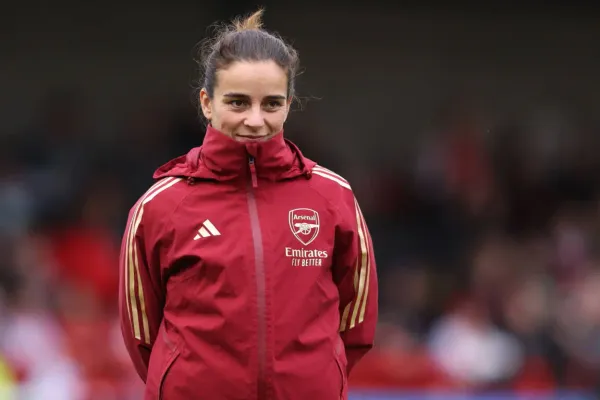I think we're on loan now...
Use of the loan market will be a KPI for Arsenal in the coming seasons
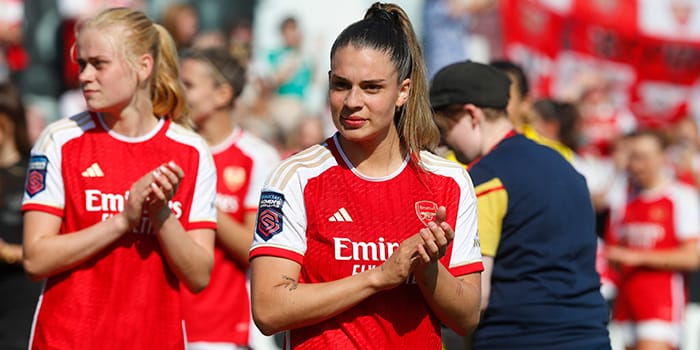
For elite women’s teams, it is very difficult to develop and nurture young talent. While the fixture list in the club game is expanding, there are still not enough games for mass rotation of players and this often means that young players can stagnate on the substitute’s bench. More and more, bigger clubs are using the loan system to develop their youth.
Manchester United sent Grace Clinton on loan to Spurs after a strong loan spell at Bristol City. Aggie Beever Jones has begun to make an impression at Chelsea after loan spells at Bristol City and Everton, while Jorja Fox spent last season with Brighton before rupturing her ACL. Of course, youth production is pretty much always hit and miss and bigger clubs will be happy to soak up the misses in pursuit of a big hit.
Defender Ruby Mace moved from Arsenal to Manchester City in the summer of 2021. Arsenal sent Mace on loan to Birmingham City in the second half of the 2020-21 season but couldn’t persuade her to sign a new deal. She joined Manchester City that summer and has since had a temporary spell at Leicester City but has moved no closer to regular first team football since leaving North London. Likewise, Jess Park enjoyed a productive loan move from Manchester City to Everton last season but her path remains blocked by Lauren Hemp and Chloe Kelly.
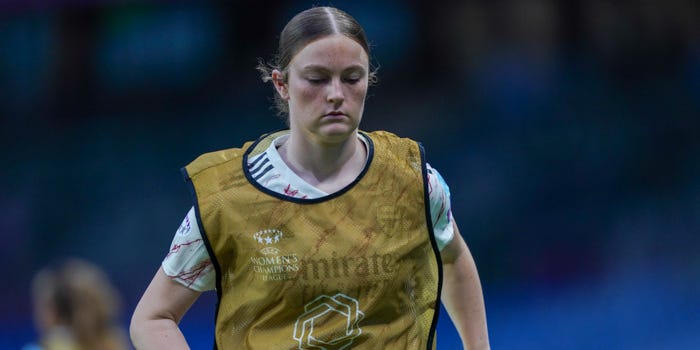
Hemp and Kelly are probably instructive cases. Hemp was a regular for Bristol City from the age of 16, which prepared her for a big move to Manchester City aged 18. Kelly came through Arsenal’s academy but became, understandably, frustrated at her path to the first team being blocked with the Gunners. She dropped down a division to join Everton on loan and despite Arsenal’s best efforts, she decided to make the move permanent. Three excellent seasons of regular football at Everton readied her for a big move to Manchester City.
At the moment, Arsenal are harbouring a pair of prodigious young talents in Brazilian winger Gio and Danish midfielder Kathrine Kuhl. Arsenal immediately loaned Gio to Everton during the first half of last season but her spell on Merseyside was hampered by injury. Arsenal recalled her from loan for the second half of last season due to injuries to Beth Mead and Vivianne Miedema and, in my view, this was a mistake.
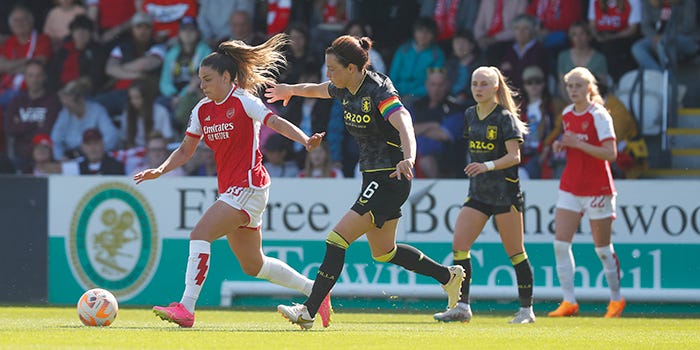
Even given the injury crisis, Gio struggled for minutes and wasn’t included in the Gunners’ revised Champions League squad for the second half of last season. Sabrina D’Angelo, a back up goalkeeper who wasn’t selected for any of the four Champions League games she was available for, was selected in the Champions League squad ahead of Gio.
Jodie Taylor was later recruited on an emergency loan, illustrating further that there wasn’t a level of trust in Gio that necessitated bringing her back to Arsenal. Whatever the reasons for it, Gio’s development was totally halted during the second half of 2022-23. Gio found similar obstacles during her stint at Barcelona but her star really rose during an outstanding loan spell at Levante for the 2021-22 season.
Gio’s situation has been exacerbated this season as she has not made the list of 25 for Arsenal’s WSL squad, with loan moves to Spurs, Atletico Madrid and, I believe, a London-based Championship side all falling through during the summer. Gio’s career has been on standstill for 18 months, she has fallen totally and utterly out of the reckoning for Brazil (even as an injury crisis gripped Brazil’s attack last spring, she still was not selected).
As Jonas Eidevall told Arseblog News earlier this season , “The idea was very much for Gio to go on loan because the reality is that we can only register 25 players. Gio is not registered to play for us. It is a tough situation for her as a player because she misses really valuable game time. It is a situation that doesn’t really benefit any parties and it’s something we need to address and look again in the winter.”
This January, it is urgent that Gio and Arsenal find a good loan solution to resurrect her career which has, unquestionably, stalled since signing for Arsenal. Kathrine Kuhl is also a prodigious talent but she has found her opportunities very limited in a crowded midfield setup, playing only six minutes in the WSL in the first half of the season. Kuhl is certainly a player who should go on loan in January and I believe that is likely.
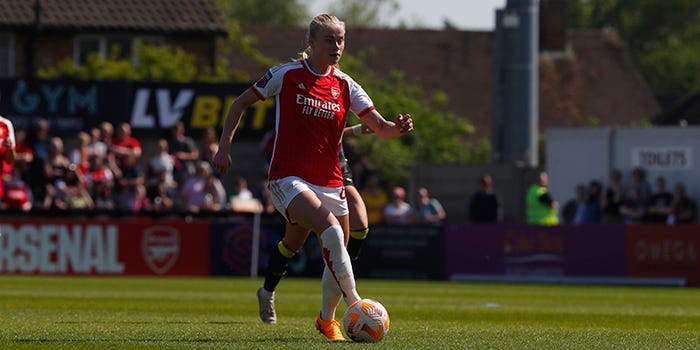
Historically, Arsenal haven’t made good use of the loan market to develop young talent, though it is only relatively recently that mid to lower table WSL clubs have had the means to take on young and fringe players from the elite. Arsenal have typically used the loan market to park surplus players ahead of a permanent parting of ways, like Anna Patten, Mana Iwabuchi and, probably, Kaylan Marckese at Bristol City currently.
Young goalkeeper Fran Stenson only played one game for Arsenal in her four years at the club, having passed through Blackburn Rovers, an abortive spell at Brighton, Birmingham City and Sheffield United. Again, all of the WSL’s elite will have plenty of similar tales, that’s just the way that youth production works. However, the club will hope for a bit of a sea change in the way they can benefit from loaning young players.
Michelle Agyemang already looks a little too good to be on loan at Watford and will probably look for a WSL loan move next season (this is speculation, not knowledge) and Freya Godfrey is currently doing well at Charlton Athletic after a strong spell with Ipswich last term. These players are 17 and 18 years old respectively and these will be considered ‘step loans’ ahead of a likely WSL loan next season.
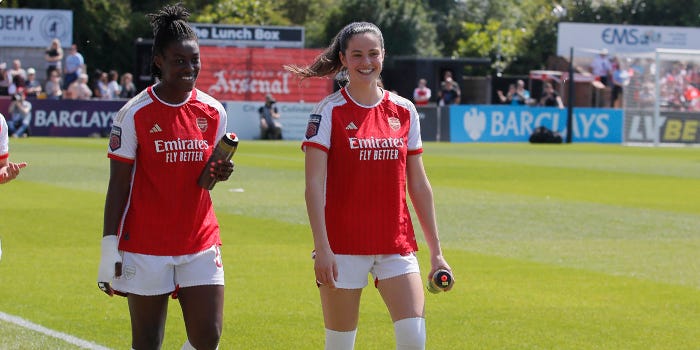
Gio and Kuhl are full internationals and at very different stages of their development. The only truly successful Arsenal loanee I can recall is Katie McCabe who spent time on loan at Glasgow City in 2017. At the time, that was a loan that was about reigniting McCabe’s confidence after she fell down the pecking order at Arsenal. That loan was very much considered a precursor to a permanent move until Joe Montemurro’s appointment and subsequent recognition of her talents in November 2017.
Gio and Kuhl should take inspiration from McCabe’s ascent from ‘promising young player who might have fallen between the cracks at Arsenal’ to one of the team’s most consistent and important senior players. Things can change quickly for young players too, a year or two ago Aggie Beever-Jones might have considered Chelsea’s forward line too crowded for her to make an impression, but the departure of Pernille Harder and injuries to Fran Kirby carved out a tiny nook of space for her and she has well and truly chipped away at it.
Arsenal have a full-time loan manager and, generally, a lot more resource dedicated to recruitment now and successful use of the loan market for players already on their books will be a KPI over the coming seasons. To repeat, youth production is an exercise in trying to bottle lightning and every club will have a mixed record in this respect. At the same time, Arsenal will want to make sure talent doesn’t stagnate on their watch and they won’t want to see successful academy products like Chloe Kelly and Lauren James burnishing their rivals.

